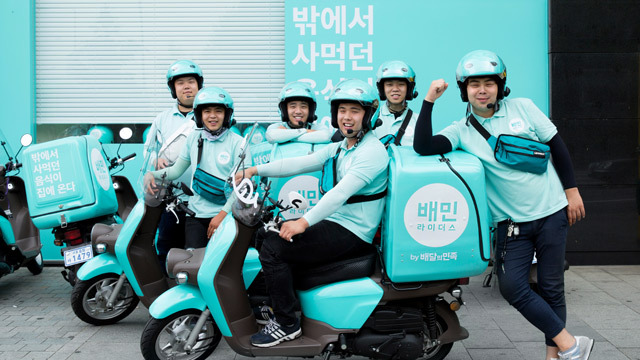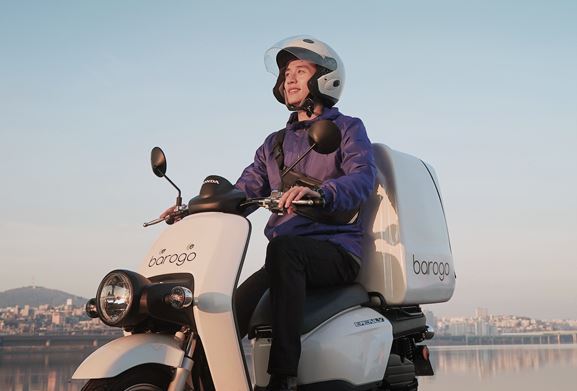Food delivery apps thrive in Korea, where 7 in 10 order via mobile
Korea’s food delivery app boom fuels M&As, partnerships with big companies
By Sohn Ji-youngPublished : June 13, 2018 - 15:35
South Koreans are big on food delivery. With just a phone call, food like fried chicken and jjajangmyeon, or Chinese black bean noodles, can be brought to one’s doorstep.
While much of this dynamic still stands, Korea’s food delivery market is quickly changing and expanding in scope, mainly riding on demographic shifts and going mobile.
Food deliveries are becoming more popular than ever, fueled by single-person households who prefer food deliveries to eating out alone. Smartphones have also stepped into the picture, allowing orders for food delivery and payment to be completed with just a few clicks.
Various food delivery apps have emerged in Korea in the past few years. This business segment is seeing a growing user base and fueling an investment boom.

Food delivery apps thrive
Seven in 10 Koreans have used a food delivery app, according to survey results released this month by TrendMonitor, run by Korean market research firm Macromill Embrain.
The firm surveyed 1,000 men and women between the ages of 15 and 59 about their experiences with delivered food and related apps.
According to TrendMonitor, 73.4 percent have experience using a food delivery app. Moreover, though phone calls are still the primary mode of placing food delivery orders, the proportion of orders made via delivery apps is increasing: from 24.9 percent in 2017 to 34.7 percent in 2018.
In terms of demographics, the biggest users of mobile delivery apps were in their 20s (44.6 percent) and 30s (47 percent). The most popular food items were fried chicken (79.8 percent) and pizza (68.5 percent), followed by Chinese food (49.7 percent) and steamed pork dishes bossam and jokbal (41.6 percent).
All-in-one convenience was cited as the biggest reason for using delivery apps, with 55.4 percent responding that the “search, order and payment procedures can all be completed on one platform.”
Though most people found delivery apps convenient, they were less trustful of the transparency of the apps’ profit-sharing structure, with 77.9 percent responding that the apps needed to make their profit-sharing models more transparent.
In general, most people expect food delivery apps will continue to grow and remain significant. Some 81.3 percent of the survey’s respondents said they “expected more people to use food delivery apps in the future.”
At the same time, around 10 percent said that they do not intend to use such apps, saying that phone and internet orders are more convenient.
Big potential means investment
The food delivery app market in Korea is already quite mature. But observers say it still has ample room for growth, given continued demand for third-party delivery services and the still-large pool of untapped users who have yet to join mobile delivery platforms.
At the moment, Korea’s highly competitive food delivery app space is dominated by local players including Baedal Minjok, run by Seoul-based startup Woowa Brothers, as well as RGP Korea’s YoGiYo and Baedaltong. And these firms have been embracing strategic M&As to expand the scope of their businesses.
In the lead is Baedal Minjok, backed by major investors including Goldman Sachs, venture capitals and Korean internet giant Naver. Since its launch in 2011, the firm has been strengthening its grip on Korea’s food delivery app sector.
For one, Baedal Minjok launched an independent delivery serviced called “Baemin Riders” in 2017, leveraging the workforce of motorcycle delivery service provider Dubaki Call acquired two years prior.
Baemin Riders is a service that allows users to order and receive food from restaurants that typically don’t offer delivery services of their own -- such as cafes or sushi shops -- for an additional fee. It aims to present consumers with more diverse delivered food options.
Closely tailing Baedal Minjok is YoGiYo, another food delivery platform app on a similar trajectory.
Last month, YoGiYo’s operator RGP Korea invested around 20 billion won ($18.55 million) in Barogo, a Seoul-based motorcycle delivery startup that handles deliveries from various restaurants, similar to Baemin Riders’ service model. The YoGiYo operator also acquired FoodFly, an online food delivery service, in 2017.

In some cases, logistics startups are moving beyond product transport to the food delivery segment. This includes Mesh Korea, which operates food delivery services under the Vroong brand.
Mesh Korea has so far secured some 75.5 billion won in investment, including 24 billion won from Korea’s internet portal giant Naver.
The company has also partnered with Kakao, operator of Korea’s main mobile messenger KakaoTalk, to facilitate food deliveries. Under the deal, Vroong handles KakaoTalk’s food delivery business on behalf of Kakao.
Beyond meals, early-morning delivery services for fresh produce and groceries are also emerging. Leading the push is Market Kurly, a popular premium grocery delivery platform operated by The Farmers.
Also invested in this fresh produce delivery space are Korea’s top retail giants, which operate large supermarket chains, including Shinsegae’s E-mart and Lotte.
By Sohn Ji-young (jys@heraldcorp.com)


![[AtoZ into Korean mind] Humor in Korea: Navigating the line between what's funny and not](http://res.heraldm.com/phpwas/restmb_idxmake.php?idx=644&simg=/content/image/2024/04/22/20240422050642_0.jpg&u=)
![[Exclusive] Korean military set to ban iPhones over 'security' concerns](http://res.heraldm.com/phpwas/restmb_idxmake.php?idx=644&simg=/content/image/2024/04/23/20240423050599_0.jpg&u=20240423183955)



![[Graphic News] 77% of young Koreans still financially dependent](http://res.heraldm.com/phpwas/restmb_idxmake.php?idx=644&simg=/content/image/2024/04/22/20240422050762_0.gif&u=)
![[Herald Interview] Why Toss invited hackers to penetrate its system](http://res.heraldm.com/phpwas/restmb_idxmake.php?idx=644&simg=/content/image/2024/04/22/20240422050569_0.jpg&u=20240422150649)





![[Exclusive] Korean military to ban iPhones over security issues](http://res.heraldm.com/phpwas/restmb_idxmake.php?idx=652&simg=/content/image/2024/04/23/20240423050599_0.jpg&u=20240423183955)



![[Today’s K-pop] Ateez confirms US tour details](http://res.heraldm.com/phpwas/restmb_idxmake.php?idx=642&simg=/content/image/2024/04/23/20240423050700_0.jpg&u=)